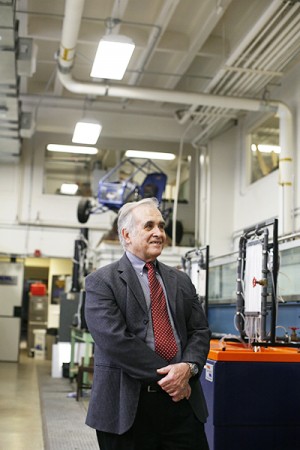The Faculty Senate will vote next month to protect freedom of speech for the growing number of professors who teach online courses or conduct research at GW, permitting them to speak out about even the most controversial ideas.

The resolution will also formally extend protection to students, administrators and trustees for the first time, but professors who helped write the three-paragraph resolution said the change was largely symbolic and that those groups had been protected under the previous statement.
The decision to clarify and broaden the definition of academic freedom will be the first change to the closely guarded faculty code as part of Board of Trustees chair Nelson Carbonell’s yearlong review, which began last fall.
Charles Garris, the committee’s chair, said the new section mostly reorganized the current statement and didn’t make any significant changes to the policies.
For example, Carbonell said at a Faculty Senate meeting last month he wanted to ensure that administrators could not shut down the work of researchers who are studying clinical trials – even if university donors stand to lose out on negative findings.
“We [wrote], ‘A faculty member shall enjoy freedom of investigation,’” Garris said. “That means that the research that they go into is up to them. They can go into any kind of area, no matter how unpopular it may be.”
Garris and several other professors said they had never heard of a researchers’ work being shut down because of potential donors.
One half of Faculty Senate members will have to approve the resolution to replace the current two-paragraph statement detailed in the Faculty Code if the executive committee approves it later this month.
Universities across the country have recently taken steps to ensure professors have freedom in their research and teaching in recent years as they expand their international reach and look toward more corporation-funded research.
The University of Oregon passed one of the country’s strongest academic freedom policies in the country last week, protecting all forms of controversial speech unless it rises to “the level of professional misbehavior or professional incompetence,” according to the policy.
The policy, which is still awaiting approval from the university leadership, would also guarantee students, professors and staff members the ability to speak out against the university, said John Bonine, one of five faculty senators who steered the effort.
“It was essential to protect right to criticize university policies without fear of retribution,” Bonine said, describing the policy as a national model for free speech.
Professors at Duke University say they haven’t felt restricted in their own research or teaching on campus, but many are concerned about how to protect faculty freedoms in its new campus in China, which held classes for the first time this year.
“Hopefully the spirit of academic freedom and openness will translate over there in the long run,” economics professor Connel Fullenkamp said. “It would be great if an American university could export that to China.”








